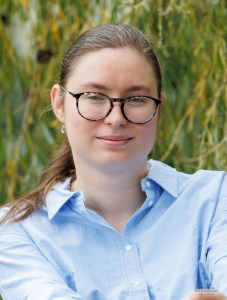 Dr. Anastasiia Zineviych
Dr. Anastasiia Zineviych
Areas of specialization: Death Studies
Areas of competence: Existential & phenomenological philosophy, hermeneutics, existential-phenomenological approach to psychotherapy and psychiatry
Personal website
I hold an MS in Psychology (2013) and a PhD in Philosophy (2019). My PhD research was conducted and defended in the H. Skovoroda Institute of Philosophy of the National Academy of Sciences of Ukraine. In my PhD dissertation “The human being and the world in the existential philosophy of G. Marcel and E. Minkowski” I investigated the phenomenology of time of Bergson’s follower E. Minkowski, a French-Jewish psychiatrist, one of the first French phenomenologists. I showed the uniqueness of Minkowski’s phenomenological approach, as he was the first phenomenologist, who founded psychopathology on Bergson’s phenomenology of lived time, where the morbid time experience constitutes a primary disorder and the cognitive disorders are its consequences.
I developed those studies in my postdoctoral research: “The hermeneutics of the narrative time as the theoretical basis for the psychotherapy of morbid time experience”, conducted at the Psychology Department of the Hebrew university of Jerusalem (March-September 2022), and at the Department of Philosophy of the Tel-Aviv University (November 2022-April 2023), via the Israeli program: “Emergency Fellowships for Ukrainian Researchers”. My research was on the edge between philosophy and psychology, focusing on the time experience in such morbid states as depression, grieving due to the loss of a close one, and Post-traumatic stress disorder, caused by war.
My research, conducted at Polonsky Academy, Van Leer Institute of Jerusalem, is focused on ways of emplotment of one’s “approaching-death” existential situation by the dying person. I am proceeding from the premise of the ultimate need for a consolatory death narrative which could be included in a wider life narrative, and that the source of our images of death is our cultural space. Using phenomenological and structural-semantic approaches, I am exploring the narratives, in which a
dying person emplots one’s existential situation, the structural units of those narratives (images, motifs, leitmotifs, plots, meta-plot), the cultural plots, analogous to the person’s narrative, which could be a possible source of it, and how the deterioration of one’s health influences one’s narratives.
Publications:
Processual and structural approaches to the end-of-life narratives analysis. Series of European Studies in Process Thought (forcecoming)
The “double being” of the human being: culture as the basis for becoming a personality. Studia Philosophiae Christianae, V.56, Issue 2, 2020, pp. 143-162. (Co-author: Illia Reiderman)
The existential and the spiritual in the existential anthropology of G. Marcel and E. Minkowski. Anthropological Measurements of Philosophical Research, № 14, 2018, pp. 142-157
Minkowski’s concept of “vital contact with reality” in existential philosophical context. Orpheus Glance. Selected papers on process psychology: the Fontarèches meetings 2002–2017, pp. 309-317